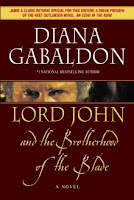Genre: Historical, Mystery
Rating: A
I think, to date, Lord John and the Brotherhood of the Blade has been my favourite of the Lord John series. It is the most action packed of the series, with Grey actually commanding in Germany for a bit (and thus, putting to good use his title of Major), and also the most revealing, as Grey begins to tell the reader more of his and his family's history. By the end of the novel you have a much firmer understanding of who Lord John Grey is and what it was that occurred in order to cause him to be such - and in order to cause his family to be the way that they are. One of my favourite aspects of the Lord John stories is the way in which he interacts with his family. Most of the interactions between Grey and his elder brother, Earl of Melton, are a bit stiff with Grey thinking about how close he and Melton are, but Melton being... well, a bit of an ass. I was really happy to see moments in this book where Melton proves to be as good of a brother as Grey, even if he does so in a manner that is far from direct.
Brotherhood picks up with Grey having returned to England from his stint in Prussia. From here he is plummeted into yet another mystery, although this one takes some time to develop. At the start of the novel a page from the last journal that Grey's father, the Duke of Pardloe, wrote before his death turns up; Grey had always been told that the journal had been burned before Pardloe's death, with this page making it apparent that someone has the journal and thus knows the secrets that it contains. A scandal surrounded the circumstances of Pardloe's death: at the time there had been rumours of a Jacobite plot, with it being insinuated that Pardloe was a member of it. His suicide was taken to be a confession of sorts, the shame of which has haunted the Grey family since - as such, Grey's elder brother refuses to use his title of Duke of Pardloe, preferring instead to remain Lord Melton. While both Melton and the Dowager Countess, Grey's mother, refuse to reveal any more about the issue, Grey embarks upon a journey to discover the circumstances of his father's death and to confirm once and for all that his father was not a Jacobite. Throughout all of this is the marriage of the Dowager Countess to her third husband, General Sir George Stanley, and consequently the re-introduction of Stanley's step-son, the dashing Percy Wainwright.
I think a huge part of the reason why I enjoyed this novel is because it answered a lot of questions for me. I have previously read Gabaldon books set in later periods that make a lot of references to this one, albeit without actually revealing the full details of what happened in it. I've always questioned just who Percy Wainwright was and what his relationship with Grey was, which is nicely addressed in Brotherhood. There is also a lot more of the family relationship developed in this novel, and in my opinion you get for the first time the real development of Grey's mother. Despite being fictional, this family feels like a real one. They turn to each other for help and worry about how things might affect other family members. Likewise, they argue and bicker, coming to passes when the desires of one conflict with the desires of others. Melton and the Dowager Countess are often seen trying to protect Grey and shield him from the potential shame of his father's actions. Grey, in change, acts very much like the stubborn younger son and goes his own way. The stubbornness of this family just makes them feel all that much more real.
There are a few problems with this book, though. Despite the fact that the novel is more action packed than other Lord John stories it is also a lot slower. It takes a long time for the mystery of the novel to progress, with much of the novel doing more to develop the characters than the actual plot. For me, this worked as I was as much interested in the characters as the plot itself. There is a bit of a squick factor in the relationship between Grey and Percy, and in the beginning I really felt like the whole relationship was a bit contrived. As it developed I became more of a fan of the relationship in general, and I found it really interesting where Gabaldon took it. Finally, there is the subplot of sodomite spies for the French. In general, I think this plot was a bit convoluted and I'm not really sure how the whole sodomite aspect came into play - the one interaction with a character accused of being such makes it clear that he is not gay - so it also felt a bit contrived. I couldn't help but feel that the only reason why that aspect of it was introduced was so that Gabaldon could show readers just how eighteenth century European society reacted to homosexuality - which as a reader I appreciated. Seeing that aspect of it really explained just the constant threat to Grey's safety because he is a homosexual. It made things a bit more real, and really made me wonder just who in Grey's family is suspicious of his inclinations and how they would react were they to find out. In the end, a lot of the problems of the novel are really justified by the overall nature of the book.


No comments:
Post a Comment